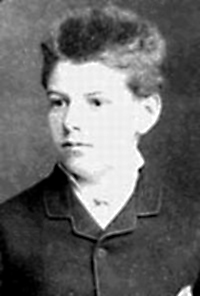Louis Bachelier
| Louis Bachelier | |
|---|---|

Louis Bachelier, aged 15
|
|
| Born |
March 11, 1870 Le Havre, France |
| Died | April 28, 1946 (aged 76) Saint-Servan-sur-Mer, France |
| Nationality | French |
| Fields | Mathematics |
| Institutions |
University of Paris Université de Franche-Comté (Besançon) Université de Dijon Université de Rennes |
| Alma mater | University of Paris |
| Doctoral advisor | Henri Poincaré |
| Known for | Contributions to mathematical finance |
Louis Jean-Baptiste Alphonse Bachelier (March 11, 1870 – April 28, 1946) was a French mathematician at the turn of the 20th century. He is credited with being the first person to model the now called Brownian motion, which was part of his PhD thesis The Theory of Speculation, ("Théorie de la spéculation", published 1900).
His thesis, which discussed the use of Brownian motion to evaluate , is historically the first paper to use advanced mathematics in the study of finance. Thus, Bachelier is considered a pioneer in the study of financial mathematics and stochastic processes.
Bachelier was born in Le Havre. His father was a wine merchant and amateur scientist, and the vice-consul of Venezuela at Le Havre. His mother was the daughter of an important banker (who was also a writer of poetry books). Both of Louis' parents died just after he completed his high school diploma ("baccalauréat" in French), forcing him to take care of his sister and three-year-old brother and to assume the family business, which effectively put his graduate studies on hold. During this time Bachelier gained a practical acquaintance with the financial markets. His studies were further delayed by military service. Bachelier arrived in Paris in 1892 to study at the Sorbonne, where his grades were less than ideal.
Defended on March 29, 1900 at the University of Paris, Bachelier's thesis was not well received because it attempted to apply mathematics to an unfamiliar area for mathematicians. However, his instructor, Henri Poincaré, is recorded as having given some positive feedback (though socially insufficient for finding an immediate teaching position in France at that time). For example, Poincaré called his approach to deriving Gauss' law of errors
The thesis received a grade of honorable, and was accepted for publication in the prestigious Annales Scientifiques de l’École Normale Supérieure. While it did not receive a mark of très honorable, despite its ultimate importance, the grade assigned is still interpreted as an appreciation for his contribution. Jean-Michel Courtault et al. point out in "On the Centenary of Théorie de la spéculation" that honorable was "the highest note which could be awarded for a thesis that was essentially outside mathematics and that had a number of arguments far from being rigorous." The positive feedback from Poincaré can be attributed to his interest in mathematical ideas, not just rigorous proof.
...
Wikipedia
